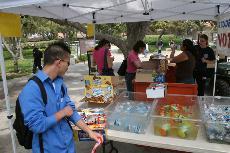By Benjamin Kwiecien

Many students were made aware of the free snacks first, then voted to recieve them. (Christopher Dietrich)
By Benjamin Kwiecien
In American politics, democracy is a highly touted process for designing and managing systems of government. Like all such processes, it can take on various forms, some more effective than others.
Generally, one of the primary goals of a democratic system is to select leadership that is best able to protect the interests and carry out the will of those he represents to the best of his ability.
Therefore, in systems where voting takes place, a voting member must decide on a candidate who best fits this criteria. All other things aside, one will ideally vote for the representative who can best carry out his function as one understands it.
What has been gathered so far is that voters must be informed. They must be aware of the issues, the system, and the nature of the candidates of the governing body. This is no small task, but it is necessary if a form of democracy is to be of any intrinsic benefit. Otherwise, it is a meaningless endeavor.
Now enter RCC.
Elections for the student government have just been held. Many have voted, but few were actually interested in RCC’s student government, and few had met any of the candidates, let alone ever heard about them.
Why vote at all, then? Two words: free food.
For those who had voted on certain election days, students would be given their choice of various tasty snacks for participating in the “democratic” process.
It’s difficult to concentrate on the political process when you are following your stomach, and with a few simple mouse clicks, the voting can easily be gotten over with.
In fact, you can even choose candidates at random to speed up the process (that is, when there is a choice).
With so many people voting with their bellies, the most informed votes-the votes that matter-are quickly drowned out. What was supposed to be an election has been turned into a sham all because of the motive to get some free food.
Considering how effective the election process has been rendered, the school might just save itself the money-money we have been made to furnish as students and taxpayers-and roll dice instead.
They could do the school a larger favor, however, by simply removing the snack incentive and letting the students vote willy-nilly. That way only those with a natural desire to affect the system will cast their vote, leading to more competent leadership, and money will be saved in the process.






